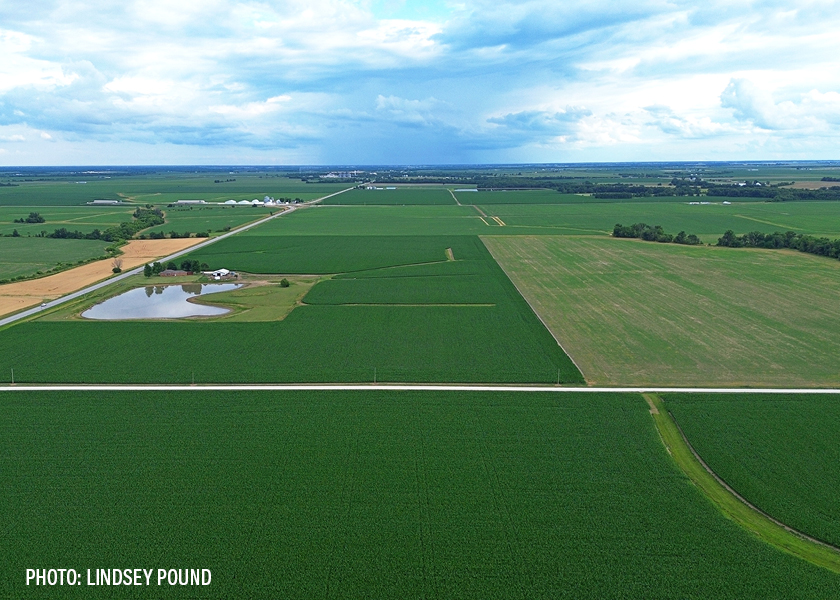A mild recession may benefit the housing market by leading to lower mortgage rates, more available supply, and potentially lower home prices.
This article mentions two Farmland REITs: Gladstone Land (NASDAQ: LAND) and Farmland Partners Inc. (FPI). The author's recommendation is to buy Gladstone Land (LAND), while Farmland Partners Inc. (FPI) is considered a clear sell.
The author's core argument is that Gladstone Land (LAND) is a better investment than Farmland Partners Inc. (FPI) based on various factors:
1. Farmland REITs, including both LAND and FPI, have faced challenges due to lower crop yield, lower crop prices, and higher interest rate expenses.
2. Prices for corn, wheat, and soybeans, which make up a significant portion of farmland acreage, have fallen since last year.
3. Farmland is becoming increasingly valuable due to population growth and shrinking arable land.
4. Gladstone Land focuses on farmland that grows fresh produce, which offers higher profitability and rental income, lower volatility, and closer proximity to major urban areas.
5. Gladstone Land has steady FFO (funds from operations) and cash flow growth, while FPI has seen declining AFFO (adjusted funds from operations).
6. LAND has better liquidity, lower debt ratios, and a stronger balance sheet compared to FPI.
7. LAND has a better dividend score, higher dividend yield, and lower valuation multiples compared to FPI.
The author also mentions the geographic distribution of LAND and FPI's farmland holdings and highlights potential risks in the sector, such as extreme weather, interest rate environments, crop price volatility, and tenant default.
A stock market rally is expected in the near term, as recent market corrections have created potential opportunities for investors to increase equity exposure, despite the possibility of a 5-10% correction still lingering. Additionally, analysis suggests that sectors such as Utilities, Staples, Real Estate, Financials, and Bonds, which have underperformed in 2023, could present decent upside potential in 2024, particularly if there is a Federal Reserve rate-cutting cycle.
Fannie Mae economists predict that the U.S. housing market will remain unchanged regardless of whether the economy experiences a soft landing or enters a mild recession, with high mortgage interest rates and housing affordability issues continuing to impact the market. They anticipate that existing home sales will remain subdued, and while a recession may lead to a pullback in construction, a soft landing accompanied by higher mortgage rates could also result in slower housing construction and sales.
Stocks are overvalued and a recession is expected in the first half of next year, according to economist Steve Hanke. He predicts that inflation will cool, Treasury yields will fall, and house prices will remain stable.
China's property sector is in crisis, with an 87% drop in the value of developers' dollar bonds and 53 companies collapsing, indicating the broader challenges faced by the nation's real-estate industry.
Rapidly falling house prices have caused a "cost of owning crisis," with tens of thousands of homeowners falling into negative equity over the past year, making it difficult to sell or remortgage properties. Experts predict that more households will face difficulties as house prices continue to decline, with the Government's tax and spending watchdog expecting a 10% fall in prices. However, there are expectations of a rebound in house prices in the future, particularly for those intending to live in their homes for several years.
The current housing market has defied expectations of a downturn in real estate prices caused by surging mortgage rates, with prices and demand remaining strong due to increasing household formation among baby boomers, according to a Wall Street economist.
Real estate investor Sean Terry predicts a "Black Swan" event in the US housing market within the next year due to affordability pressures caused by high interest rates and housing prices, which could lead to a market crash. However, experts argue that a crash like the one in 2008 is unlikely due to the current housing shortage and limited supply of homes. The future of the housing market will depend on factors such as economic stability, mortgage rates, and homebuilders' ability to increase supply.
Utah's housing market experienced volatility and a contraction due to the COVID-19 pandemic, leading to a decline in home prices and affordability issues, but experts do not predict a crash due to the state's strong economy and growth, although a housing shortage is expected to worsen by 2024. Interest rates have caused fluctuations in homebuilding activity, and despite a dip in housing prices, affordability remains a challenge for many. Predictions for the housing market include a modest price correction, an increase in homebuilding activity and real estate sales in 2024, and a continuing housing shortage. Interest rates will play a crucial role in determining the future of the market.
Jeremy Grantham warns of a looming recession by early 2025, expresses concerns about US stock market, economy, and financial system, discourages investment in real estate and commodities, but supports climate-change stocks like Tesla.
The housing market is facing challenges due to high mortgage rates and low home sales, leading economists to predict a mild recession in 2024.
